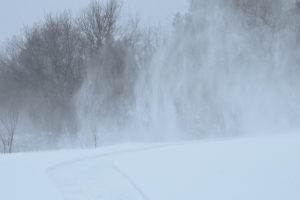Asthma Can Be Prompted by Cold Air

There are many things that can trigger asthma ranging from dust, pollen, and mold. Cold air is something that can also lead to asthma. When the seasons change and the temperature drops, going outside to into the cold air can make it harder to breathe and lead to asthma symptoms. There are a few reasons why cold air can trigger asthma.
The cold air is dry
The airways of the lungs are lined with a thin layer of fluid. When dry air is breathed into the airways, the fluid evaporates faster than the body can replace it. The airways become dry making them irritated and swollen, which can worsen asthma symptoms. The cold air can also stimulate histamine release into the body, which is a chemical known to be released during an allergy attack. Histamine causes wheezing and other asthma related symptoms.
The cold air can increase mucus
The airways of the lungs are also lined with a layer of protective mucus. Mucus is produced to help remove harmful particles. When the weather is cold, the body will produce thicker, sticker, and more mucus than normal. The type of mucus produced in cold weather makes it more likely to catch a cold or get other respiratory related infections.
More likely to get sick during the cold months
Respiratory type of infections, colds, and flu usually are more common during the winter months. The addition to the more mucus production, these infections can set off asthma symptoms.
Staying indoors more during the cold months
The cold air during the winter months can lead to staying indoors. When staying inside more often, there is more exposure to indoor dust, mold, and pet dander. These are all known allergens that trigger asthma symptoms.
Take control of your asthma during the cold
It is important to make sure asthma is controlled before the cold months arrive. Be sure to take the medicines prescribed for your asthma is taken regularly and develop an asthma action plan. Remember to also have your quick relief medications with you at all times. You can also wear a scarf during the cold months to help warm the air before the air is breathed into your airways. Drinking extra fluid in the winter can help with thinning out the mucus.
If you have any questions on how cold air can cause an asthma attack during the winter months, give us a call at 805-658-9500. Our great team at Allergy, Asthma, and Immunology Medical Group is here to help you today!



